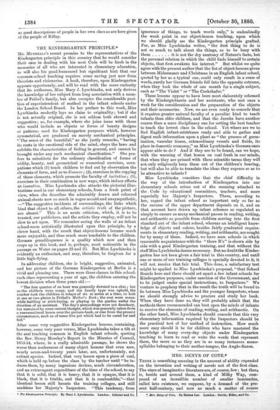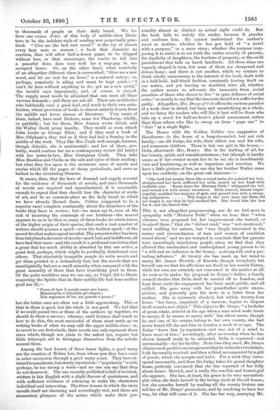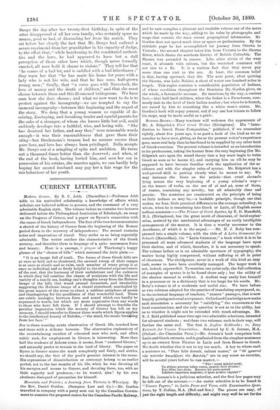MRS. DENYS OF COTE.*
THERE is something amazing in the amount of ability expended on the invention and writing of novels not of the first class. The stars of imaginative literature-are, of course, few; but there is, beside and around them, a kind of Milky Way, com- posed of an incredible number of smaller luminaries, called into existence, we suppose, by a demand of the pre- sent half-century, and now as much a matter of course ! Mrs. Denys of Case. By Holum Lae. London : Smith, Elder, and Co.
to thousands of people as their daily bread. We be- lieve one raisons cretre of this body of middle-class litera- ture to be the indolent style of reading now perpetually prac- tised. "Give me the last new novel !" is the cry of almost every lazy man or woman ; a book that demands no exertion, that will allow half-a-dozen pages to be skipped without loss, or that encourages the reader to fall into a peaceful doze, does very well for a stop-gap in un- occupied hours. Or, on the other hand, when somebody of an altogether different class is overworked, "Give me a new novel, and let me rest for an hour," is a natural outcry ; or, perhaps, somebody is ailing and must be kept quiet,—'• I can't lie here without anything to do ; get me a new novel," the invalid says imperiously, and, of course, is obeyed. The supply must needs be abundant that can meet all these various demands ; and these are not all. There are multitudes who habitually read a good deal, and much to their own satis- faction, whose provision of books is almost entirely drawn from the middle and lower classes of literature. Very many of them, indeed, have read Dickens, some few Thackeray, wholly, or partially ; but for them, Miss Austen wrote drivel, and Sir Walter Scott prosy inanity. They would as soon attack John Locke as George Eliot; and if they read a book of Mrs. Oliphant's, they feel as if they had had a Sunday in the middle of the week. They like Mrs. Craik well enough, because, though didactic, she is sentimental ; and few of them, pro- bably, would confuse her (as a contemporary review did lately) with her sister-in-law, Miss Georgiana Craik. They take Miss Braddon and Ouida as the salt and spice of their reading ; but what they live upon is the enormous mass of novels and stories which fill the pages of cheap periodicals, and serve as ballast to the circulating libraries.
It seems, then, that the laws of demand and supply account for the existence of thousands of novels, and since thousands of novels are required and manufactured, it is reasonable enough to expect that they should lose the character of works of art, and be as common-place as the daily bread to which we have already likened them. Critics (supposed to be a superior race) complain continually about the dreariness of the books they have to review ; but—we must say it, even at the risk of incurring the contempt of our brethren—the marvel appears to us to be that so many of these books do retain traces of the higher origin of their species; that such a vast number of writers should possess a spark—even the feeblest spark—of the sacred fire that makes a good novelist. The present writer has been from babyhood a devourer of novels—good, bad, and indifferent, all have had their turn—and the result is a profound conviction that a great deal too much ability is absorbed by this one metier, a great deal, perhaps, which might be profitably distributed over others. That absolutely incapable people do write novels and get them printed is a melancholy fact, but the novels that are unmitigatedly bad are a small minority when compared with the great assembly of those that lave something good in them. Of the quite worthless ones we can say, as Virgil did to Dante respecting the Spirits that in their earthly life had done neither good nor ill,—
" Fama di lore il mondo esser non lassa;
Misericordia e Giustizia gli sdegna ; Non ragionam di lor, ma guarda e passa ;"
but the better ones are often not a little aggravating. This or that in them is good, but the whole is not good. We feel that if we could pound two or three of the authors up together, we should do them a service ; whereas, until Science shall teach us how to do this, the most successful of them must needs go on writing books of what we may call the upper middle-class ; or, to revert to our first simile, their novels can only represent those stars which, though not plain to the naked eye, require but little telescopic aid to disengage themselves from the nebulas around them.
Among the best known of these lesser lights, a good many are the creation of Holme Lee, from whose pen they have come in sober succession through a good many years. They have at- tained to a moderate, but steady reputation—" popularity" would, perhaps, be too strong a word—and no one can say that they do not deserve it. The one recently published is full of incident, written in fair English with a slight flavour of quaintness, and with sufficient vividness of colotuing to make the characters individual and interesting. The three houses in which the story unrolls itself are charming and exceedingly real, and there are momentary glimpses of the actors which make their per- sonality almost as distinct as actual sight could do. .But the book. fails to satisfy the, reader, because it puzzles
and confuses him. He cannot understand the author's mood or motive ; whether he has got hold of " a novel with a purpose," or a mere story ; whether the purpose (sup- posing it to exist) is to set forth the undue severity of parents, the duplicity of daughters, the burdens of property, or the swift punishment that falls on harsh landlords. All these ideas are vaguely shaped in turn, but none of them are sharpened and driven home ; and there is yet another, which we venture to
think wholly unnecessary to the interest of the book, dealt with in a half-bold, half-timid fashion, constantly forcing itself on
our notice, and yet leaving us doubtful, aftbr all, whether the author means to advocate the immunity from social penalties of those who choose to live "in open defiance of social order," or merely to say that the innocent should not suffer for the
guilty. Altogether, Mrs. Denys of Cote offers the curious paradox of a work clear in detail, but hazy and unsatisfying as a whole, and we fancy the readers who will like it best will be those who•
take up a novel for half-an-hour's placid amusement, rather than those others who like to sweep on from "page one" to " finis " at a single flight.
The House with the Golden Gables—too suggestive of Hawthorne—is the home of a long-descended, but not rich family,—an old Judge, his wife, their eldest son and his wife, and numerous children. There is but one girl in the house,— Delia, afterwards Mrs. Denys. She is the darling of all, for her beauty, spirit, and warmheartedness ; but (though it hardly seems as if her creator meant her to be so) she is inordinately vain and headstrong, as well as imperious and exacting. We have a little picture of her, as one day her brother Walter came upon her suddenly, on the great oak staircase :—
"She held her scanty dress like a royal train, she pointed her foot, straightened her back, stiffened her neck, tossed up her head with
ineffable airs. Room there for Mistress Pride !' whispered the lad, and bowed low with mimic reverence. Delia started, almost imper- ceptibly modified her majesty of gait, and passed him with a sweep- ing indignation Wat forgot it the next hour, but Delia did not forget it, nor that he had mocked her. Sho loved him the less for if, and she feared him."
This is not altogether prepossessing, nor do we feel more in sympathy with "Mistress Pride" when we hear that "when schemes were proposed for her improvement she waived, or despised them ;" that she "did not read," was "not emotional," cared nothing for uature, but "was deeply interested in the names and circumstances of men and women of condition round about," and we are tempted to conclude that her parents were exceedingly injudicious people, when we find that they allowed this uneducated and undisciplined young person to be "a will and an influence in the house,—a strong will, and a per- vading influence." At twenty she has made up her mind to marry Mr. James Herrick, of Knowle, though everybody but herself can see that his affections are fixed on her cousin Fanny, while her own are certainly not concerned in the matter at all.
As soon as he makes his proposal to -Fanny's father, a family council decides that Delia shall be carried off to London, and kept there until the engagement has been made public, and all settled. She goes away with her grandfather quite unsus- picious, and presently gets the news in a letter from her mother. She is extremely shocked, but within twenty-four hours "her fancy, impatient of a vacuum, begins to disport itself round a new object." This object is Mr. Denys, "a bachelor of great estate, arrived at the age when a man must make haste to marry, if he means to marry well," but whose name, though he and one of his estates belong to her own county, she had
never heard till she met him in London a week or so.ago. The Judge "knew him by reputation, and was not of a mind to
know more of him ;" accordingly, after an evening when he has shown himself ready to be attracted, Delia is reproved—not unreasonably—for her facility. Next time they meet, Mr. Denys
obtains such positive encouragement that he writes her two letters, bath favourably received, and then a third, accompanied by a gift of jewels, which she accepts and hides. For a week they corre- spond incessantly, and then the Judge takes his grand-daughter home, perfectly convinced that she has repented of her folly about James Herrick, and is really the sensible and honest girl she appears. She has, at least, the grace to be very uncomfort- able when she finds herself in the loving circle at the old house ; but she consoles herself by reading all the county history can tell her of Mr. Deny? possessions, and by resolving to have her way, let what will come of it. She has her way, marrying Mr.
Denys the day after her twenty-first birthday, in spite of the utter disapproval of all her own family, who certainly spare no means, good or bad, of dissuading her from the match. They set before her clearly the fact that Mr. Denys had suffered a severe reprimand from her grandfather in his capacity of Judge, to the effect that," while hearkening to the constituted authori- ties and the laws, he bad appeared to have but a dull perception of those other laws which, though never formally enacted, all men hold it shame to violate." They tell her that he comes of a bad lot, and is saddled with a bad inheritance ;" they warn her that "he has made his home for years with a lady who is not his wife, and that he has sons, half-grown young men ;" finally, that "a curse goes with Navestock, the love of money and the death of children," and that she must choose between them and this ill-omened bridegroom. We have seen how she does choose ; and what we now want to do is to protest against the incongruity—we are tempted to say the immoral incongruity—between this beginning and the sequel of the story. We deny that a young woman so capable of de- ceiving, disobeying, and forsaking tender and careful parents for the sake of a stranger, of whom she knows little but evil, could suddenly develope into a faithful, wise, and loving wife. "She has deceived her father, and may thee," were reasonable words enough—it was their reasonableness that gave them their sting—but Desdemona's treason had no meaner excuse than pure love, and love has always been privileged. Delia accepts Mr. Denys out of a mingling of spite and ambition. He turns out a thousand times better than she deserved; and when, at the end of the book, having buried him, and seen her son in possession of his estates, she marries again, we can hardly help hoping her second husband may pay her a fair wage for the mis behaviour of her youth.








































 Previous page
Previous page